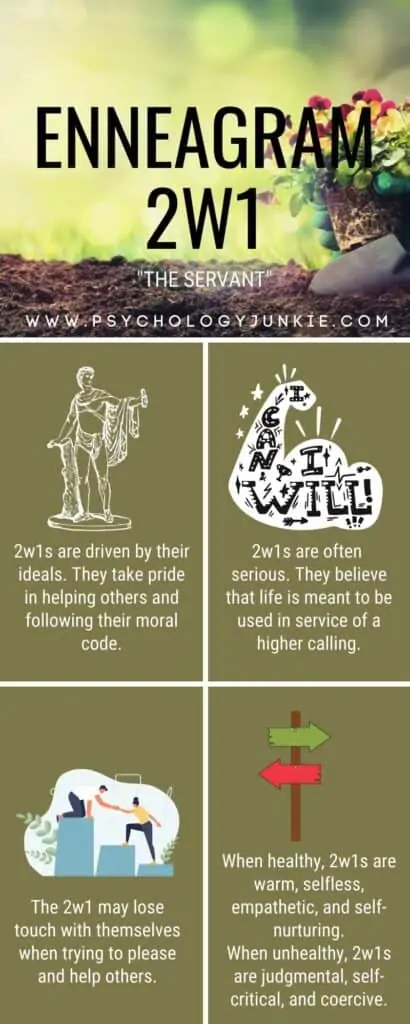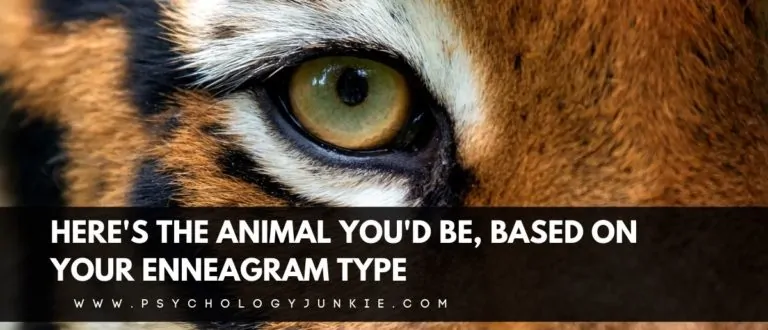All About the Enneagram 2w1 Type
So you’ve discovered that you’re an Enneagram 2 type, or someone you love is an Enneatype 2. You’ve read the descriptions, but suddenly you’re hearing things about “Wings” or “Subtypes.” Perhaps the questionnaire you took said that you were a 2 with a 1 wing. What does that even mean? Well, today we’re going to find out! In this article we’ll break down what separates a 2w1 from a 2w3 and some of the great things…and not so great things about being this particular type.
Not sure what your enneagram type is? Take our new personality questionnaire here!

This article contains affiliate links. If you purchase an eBook or print book from one of my links I get a small percentage back to help run my site.

Table of contents
Estimated reading time: 8 minutes
What is a Wing Anyway?
Your wing is like a second side of your personality. It acts as your sidekick and helps you go after your inner motivations, goals, and unconscious needs. You have your core type (in this case, the Two) but the wing is an extension/partner to your core type.
2w1 vs 2w3 – What’s the Difference?
Twos with a One wing are driven to live up to their ideals and high standards. They believe a life best lived is a life given in service to others. As such, they tend to be serious, driven, and even uncomfortable with accolades or compliments. On one hand, they crave affirmation and love, yet on the other hand they often feel morally conflicted if they take pleasure in compliments or praise.
Twos with a One wing are usually more dutiful, responsible, and morally-minded than the Two with a Three wing. While many people focus on matters of ethics and morality, to the 2w1 these things take center stage. These Twos are more self-critical than 2w3s tend to be, striving to live up to their high standards but often failing because they are impossibly out of reach. Feelings of guilt are more of a problem to this type. If the One wing is very strong, and if the Two is unhealthy, they may be less kind-hearted than your typical Two, and more critical and judgmental.
Two with Three wings on the other hand have a profound desire for achievement and success. This type is usually more charming and seductive than the Two with a One wing (although 2s, in general, have a knack for being seductive). The 2w3 can instantly read a room and know how to blend in and make a positive impression. They are social chameleons, often charismatic and witty, driven towards success an achievement more than moral idealism.
You can find out more about the Enneagram 2w3 type in this article: Getting to Know the Enneagram 2w3 Type
The Root Desire of the Enneagram 2: To be loved
The Root Fear of the Enneagram 2: To be worthless or unlovable
The Vice of the Enneagram 2: Pride
Signs That You’re a 2w1 Enneatype:
(Several of these will also apply to 2w3, but 2w3s are less likely to relate to all of them)
- You have a strong desire to relieve human suffering
- You don’t mind taking on thankless or tedious tasks if it will help others
- You strive to be practical and reasonable
- You care about the disenfranchised or persecuted
- You often think about whether or not you are a “good” or “bad” person
- You fight against your “selfish” feelings
- You crave affirmation but feel uncomfortable when actually given praise
- You want attention at times, but you feel uncomfortable drawing attention to yourself
- You want to be significant in people’s lives
- You are self-critical and often feel guilty for taking time for yourself
- You worry that others will stop being close to you if you stop being so generous and supportive
- You feel happy when you know you are making a positive impact on someone’s life
- When you’re stressed you can be very judgmental
- You consider yourself a “healer” of the hurting
- You struggle to prioritize your own needs
- You enjoy encouraging others
- You struggle to take credit for the things you have done well
Famous 2w1s:
Mother Teresa, Desmond Tutu, Florence Nightingale, Ann Landers, Eleanor Roosevelt, Meryl Streep, Jennifer Garner, Margot Robbie, Lewis Carroll, Albert Schweitzer
The Childhood Struggle of the 2w1:
As children, Twos often felt like calling attention to their own needs was selfish and put them in the way of their parents. They were given the impression that the “right” way to be was to be selfless. While selflessness has its merits, it can be detrimental when it becomes martyrdom. 2w1s learned not to ask for help, not to assert their own feelings or needs, and that they must give in order to get by in life. Sometimes this was unconsciously done by the parents: perhaps their religious background or other messages praised selflessness to an unhealthy degree. Other times the message was more overt; perhaps the 2w1 was verbally berated or punished when they asked for things for themselves. As a result of these childhood messages, the 2w1 learned to repress their own needs and lavish their attention and care on others.
2w1s learned to find their place in the family system by being the helpers and supporters, and this way of existing eventually became who they were in subsequent relationships. In fact, many times 2w1s lavish the attention and affirmation on others that they wish others would have give to them at earlier times in their lives.
There’s an underlying sense of grief in the Two enneatype that stems from this dynamic. They worry that deep down they are unlovable, or unworthy of love. They worry that maybe they’ll never be “good” enough or give enough of themselves to be acceptable. Even when these types do receive love it isn’t as satisfying as they think it will be because it’s often given as thanks for their acts of service rather than for who they are underneath the caring exterior.
As 2w1s grow in maturity and wisdom they learn that it’s okay to ask for things. They learn which relationships are solid and dependable and which friends are fair-weather friends. Taking care of themselves becomes a natural part of their daily life, but they also know how to give without any ulterior motives.
Growing and Thriving as a Two with a One Wing:
- Pause before saying yes. When someone asks something of you, take some time to think it over before immediately reacting with a “Yes! Of course!” Even just taking a whole minute of silence to think things through can help you to make a more intentional decision. Remember that it’s okay to say no!
- Take time to assess your needs. Sometimes you’re so busy interacting with other people and getting things done that you’re steamrolling over your own needs. It’s a good thing to take care of yourself. Self-care can seem self-indulgent and selfish if you look at it through an unhealthy lens. It’s important to make sure you’re getting enough rest, getting proper nutrition, getting time for yourself, time to laugh, play, etc,.
- Work on creating healthy boundaries. Learn how to be completely in your own body and mind when other people are talking to you. Instead of “reading” them or instantly thinking of how you can help, stay connected to yourself. This doesn’t mean you should be cold or tactless with them. It just means that you should respect yourself. Say no when you don’t want to do something. Stand firm when you don’t agree with someone. Tap into your own point of view instead of always empathizing and identifying with the other person in the situation.
- Ask for help. Don’t burn yourself out by having to be the perfect, responsible one all the time. Being open about what you want or need helps you to enrich your relationship, get rid of resentment, and develop greater integrity. Remember that when you ask for help, the person’s style or approach may be different than yours – and that’s okay. Allow people to help you in their own way.
- Recognize what your true voice really is. When your inner critic belittles you or calls out your failures (or the failures of others), learn to recognize that voice as something other than your own. Pay attention to how that voice effects you and your well-being. Is it doing more harm than good? Pay attention to the child inside, and the voice trying to break through all the criticisms that the critical voice puts on you.
- Find some independent activities that bring you joy and satisfaction. Exercise, meditate, take a walk, journal, listen to music. Enjoy getting to know yourself!
What Are Your Thoughts?
Was this article helpful? Do you have any advice or insights for other 2w1 Enneatypes? Let us know in the comments!
Other Articles You Might Enjoy:
The Emotional Patterns of Every Enneagram Type









I believe I am a 2w1 type learning to make my way in this world. I considered the Catholic Church ministry for about 2 seconds. I realize now life is more about personal integrity and getting along with others. Sometimes service is needed. I try to fill that gap when I can. Like Ghandi said “My life is my message.”
Thank you. Everything in the article felt like it resonated with me.
I’m so glad!! Thank you for the feedback 🙂
Thanks for sharing this valuable information! It seems I’m type 2w1. It makes sense… very interesting.
This is me! I recognise the pattern and it has recurred throughout my life and career as a nurse!! I have to say that in nursing it’s a particularly easy “trap” to fall into because there is always more to be done than there is time to do it in.
I really enjoyed this post! It was very informative and I learned a lot about the enneagram 2w1 type.
This is an interesting and informative post about the Enneagram 2w1 type, which I found quite insightful. It’s great to learn more about personality types and how they can impact our lives. Keep up the good work!